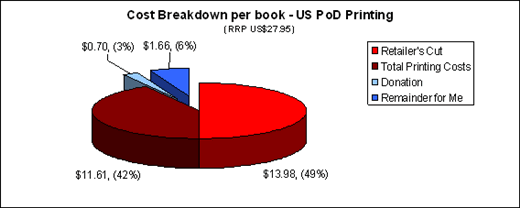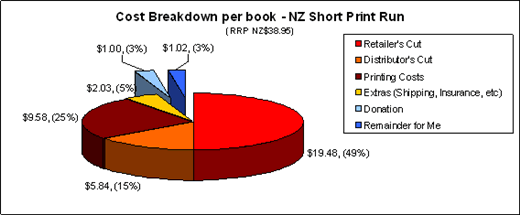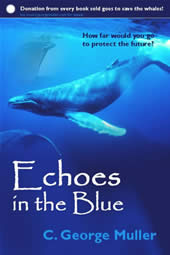Frequently Asked Questions
- Is Echoes in the Blue fact or fiction?
- Are you a scientist?
- Are you risking your career as a scientist by speaking out?
- Then why are you doing this?
- What’s wrong with whaling? Can’t a hunt be managed sustainably so everyone is happy?
- How does whaling affect me? It’s not my problem!
- What can I do to help end whaling?
- What’s up with the Donation? Is this some kind of scam to make money?
- Why should I buy Echoes in the Blue? Why not give a donation straight to a charity?
- How much do you donate from each book?
- Why don’t you donate the entire cover price of the book? Are you trying to profit from this?
- Do you own the publishing company that produces Echoes in the Blue?
- Does owning the publishing company mean you make more money from Echoes in the Blue?
- Do you advocate violence as a solution?
- How do you respond to claims that Echoes in the Blue is responsible for inciting violence?
- Are you racist / anti-Japanese?
- Aren’t other countries involved in whaling too? Why single out Japan?
- Are you a member of Greenpeace / Sea Shepherd / etc?
- Does Echoes in the Blue criticise environmental organisations?
Is Echoes in the Blue fact or fiction?
Unfortunately, whaling is all too real.
The story is presented using fictional characters and events, yet the central premise and many elements of the plot are definitely true. All facts and figures presented in the story are accurate, and were up-to-date at the time of publication. See Author Note above for more details.
As a marine biologist I strongly believe this is a message the world needs to hear – before it’s too late!
I chose to write this story as a “fictional” thriller for two reasons:
1) Some things can be said only within the scope of fiction! The whaling industry is run by large companies that are extremely rich and well-connected. At the risk of incurring libel allegations or other lawsuits I cannot name any names.
2) As well as presenting the facts I wanted to tell a story - to show you what it’s actually like to be out there on the front line…
* Please note the legal disclaimer on the book: This novel is a work of fiction. Names, characters, and organisations are the product of the author’s imagination or are used fictitiously, and any resemblance to actual persons, living or dead, is entirely coincidental.* Back to Top »
Are you a scientist?
Yes. I have an MSc degree and have worked as a wildlife biologist for the past 7 years, including working with marine mammals. I have collaborative articles published in reputable scientific journals like Marine Mammal Science, Wildlife Research, Marine Pollution Bulletin etc.
* Please note though that I am taking this stand entirely as an individual. I have not meant to imply endorsement of my activities or my opinion by any scientific publication, institution, government department, or university I may have worked for, nor by any colleague I may have worked with*Back to Top »
Are you risking your career as a scientist by speaking out?
Quite possibly. Scientists are supposed to remain objective at all times and limit themselves to dealing only with facts.
By saying publicly how I feel about whaling I may never be employable as a scientist again.Back to Top »
Then why are you doing this?
I saw a wrong that needed putting right. Something needed to be done before it was too late, and I saw something more I could do to help make a difference.
In short, I want to try to leave the world a better place than when I found it…Back to Top »
What’s wrong with whaling? Can’t a hunt be managed sustainably so everyone is happy?
In theory: maybe. But in practice what looks good on paper is often never achievable in real life. The simple answer is that no one knows how many whales there are, so how can we possibly know what might be a sustainable number that can be killed?! Plus, any kind of quota system is always open to abuse when there are profits to be made!
You only have to look at the results of past hunting to see that. Many whale populations are at their lowest numbers ever, and some have never recovered from the slaughter of a hundred years ago – despite being fully protected for over 50 years!
The whaling industry has had its chance, and has already proven itself incapable of carrying out any sustainable hunt.
Conversely, many animal rights groups believe the slow and painful death whales suffer is barbaric and should not be tolerated in a civilised society.
Science has shown whales are intelligent beings capable of experiencing many complex emotions – just like ourselves.
The simple fact is that whaling is driven purely by greed. We do not need to kill whales for our own survival, nor even for any significant economic need. Isn’t it time we left the last survivors alone to live out their lives in peace, just as we might wish if the roles were reversed?Back to Top »
How does whaling affect me? It’s not my problem!
As citizens of this planet, whaling affects all of us. What kind of a world do you want to leave for your kids, or your grand-kids, to live in? I believe we have a responsibility to leave things in a better state than we found them – or at least not make the situation any worse!
Extinction is forever. How do you think history will judge us if we are the generation responsible for losing the whales?
This is everyone’s problem. The High Seas belong to no one, or to everyone. Change for good can only take place if individual people decide they care, and are willing to stand up and do something about it.
If you still don’t think whaling is your problem, I challenge you to read Echoes in the Blue first and then decide!Back to Top »
What can I do to help end whaling?
Order a copy of Echoes in the Blue! If you already have one, order another as a gift for someone! For every book sold I will donate a portion of the proceeds directly to a registered non-profit organisation to help end whaling.
Add your voice to the call. Change can only happen if individual people decide they care enough to do something about it. For more ideas on effecting change see my Author's Note above.Back to Top »
What’s up with the Donation ? Is this some kind of scam to make money?
No scam. I am serious about ending whaling. As an award-winning fiction writer already I decided this was the best way I could spread the word and help raise money at the same time.
The Donation is automatic (unless you wish to make an additional private donation) and it is included in the retail price of the book – for every copy of Echoes in the Blue sold I will give a portion of the proceeds to Save-the-Whale charities.Back to Top »
Why should I buy Echoes in the Blue? Why not give a donation straight to a charity?
By all means donate to a charity if you wish. All I’m offering is that if you order this book you get to make an automatic Donation to help save the whales and receive an exciting and informative book highlighting the truth about illegal whaling! ;)Back to Top »
How much do you donate from each book?
I donate NZ$1.00 from each book sold through normal retail channels. This may not sound like a lot, but it’s actually 1/3 of the money I make from each book. (See Costs graph below).
I pay the Donation out of what is left over after all of the book’s production costs are paid and everyone else has taken their cut – which leaves an even smaller fraction for me to pay my remaining expenses.Back to Top »
Why don’t you donate the entire cover price of the book? Are you trying to profit from this?
No. Books are very expensive to make and there are many significant costs involved. Direct costs incurred getting each book sold are automatically deducted from the cover price (eg. printing, distribution, retailer’s cut, shipping to suppliers etc).
The red, orange and yellow pie pieces in the graphs show the direct costs that must be deducted from the RRP (Recommended Retail Price) for each copy of Echoes in the Blue, while the blue pie pieces show what is left over for me and the Donation for the whales:


Note – I have also spent over NZ$5000 in additional indirect costs which aren’t automatically deducted from the book price (including text and cover design, formatting and layout fees, marketing, publicity, promotional materials, web site maintenance, etc). Since I have a little over a dollar left over for me from the sale of each book this means I still need to sell over 2000 books just to break even!!!
Writing is a full-time occupation and I have given up full-time employment to pursue it. I have already been forced to sell my car to raise money to support my writing habit! If you like my writing and would like to see more books one day, please help by ordering more copies of Echoes in the Blue. Books make wonderful gifts!Back to Top »
Do you own the publishing company that produces Echoes in the Blue?
Yes. I created my own publishing company for the simple reason that it was the only way to see this book in print in a timely manner. Traditional publishing has delays of 1-2 years before a book appears in print, and I strongly believe Echoes in the Blue is a story that needs to be told NOW!
In addition, the whaling industry has the support of powerful business backers, and I suspect many of the regular book publishing companies I approached were too scared to carry my book for fear of being sued by them!Back to Top »
Does owning the publishing company mean you make more money from Echoes in the Blue?
Definitely not! Actually, the reverse is true. By owning and running the publishing company it now becomes my responsibility and expense to create, print, market and distribute all copies of my book.
In addition, I become the target if the whaling industry tries to sue anyone!Back to Top »
Do you advocate violence as a solution?
No. That would be very irresponsible of me, wouldn’t it?
Let me repeat that Echoes in the Blue is a work of fiction and the actions or opinions expressed by any of the story’s characters do not necessarily represent my own.Back to Top »
How do you respond to claims that Echoes in the Blue is responsible for inciting violence?
I cannot take credit or blame for someone else’s actions. I believe every person is responsible for their own conduct. Everyone must make their own choice to act as they think best. How they act is their own decision, and their own personal responsibility.Back to Top »
Are you racist / anti-Japanese?
No. My book and my message are anti-whaling, not anti-Japan.
Claims of racism are a common tactic used by the whaling industry in an attempt to defend what they do.
Any opinions expressed by characters in Echoes in the Blue (on either side of the debate) do not necessarily represent my own. I would like to stress that I have absolutely nothing against the government or people of Japan – except those involved in whaling.Back to Top »
Aren’t other countries involved in whaling too? Why single out Japan?
True, and for the record I am against all whaling – but I can only take on one opponent at a time! Fiction requires a concise plot, so Echoes in the Blue targets Japan as the primary offender for the following reasons:
- Japan kills the most whales.
- Japan is the only country to still operate a pelagic (high seas) whaling fleet which they send far away from their own territorial waters to conduct their industrial-scale hunt.
- The Japanese market for whalemeat provides the main incentive (financial!) for all other whaling nations to continue whaling too.
- Japan is the ringleader amongst whaling nations. They are the only country who never gave up whaling, despite the moratorium. They are also actively trying to encourage as many other countries as possible to take up whaling again to strengthen their position.
- The Japanese whaling industry uses very underhanded tactics to get their way, including cynical exploitation of the International Whaling Commission’s “scientific whaling” loophole, vote-buying, bribery, intimidation and more.
Are you a member of Greenpeace / Sea Shepherd / etc?
No. I am not affiliated with any environmental organisation, nor they with me. I do not consider myself an environmental activist. I am just a concerned individual trying to make a difference to the world in whatever small way I can.Back to Top »
Does Echoes in the Blue criticise environmental organisations?
Maybe. That depends on your point of view, but it was not my intent. The book is written from several points of view, including those of a scientist and a “regular guy”. Their opinions may not always be in complete agreement with the beliefs or actions of some environmental activists, but as I have already pointed out the opinions expressed by any of the story’s characters do not necessarily represent my own – although they do span the large cross-section of beliefs that surround many environmental issues today.
However, with that said I believe environmental organisations do play a part in the important role of alerting people to the important issues we all must face up to.
Whaling is a problem that affects all of us, and we all have our own part to play however we think is best.Back to Top »
